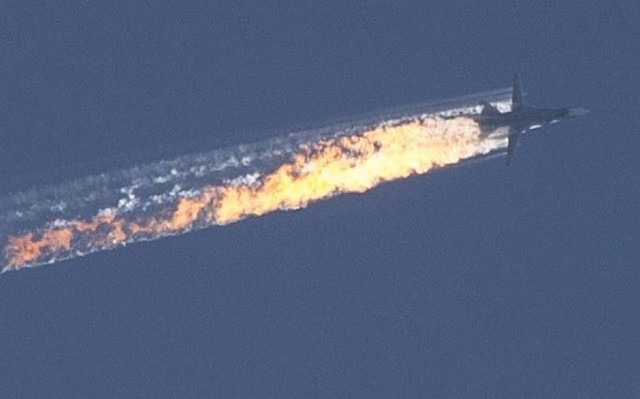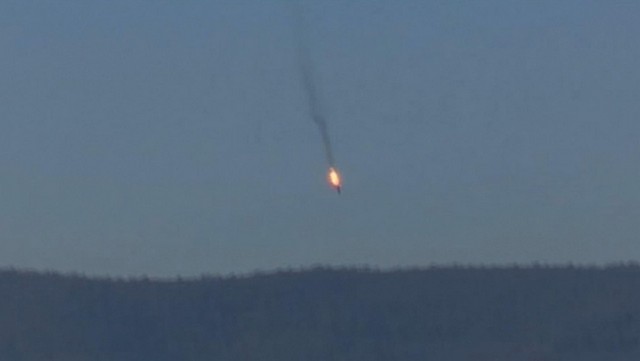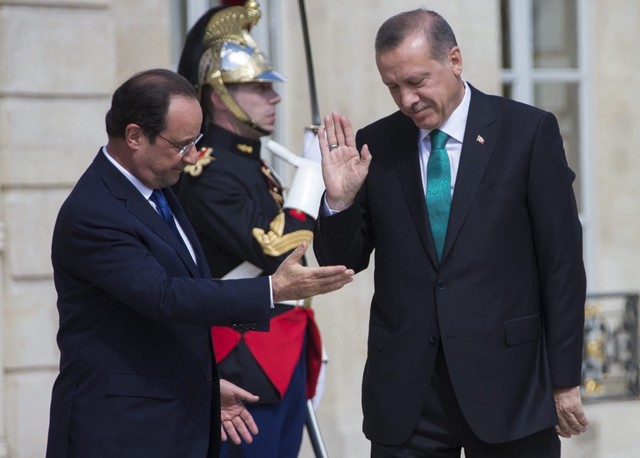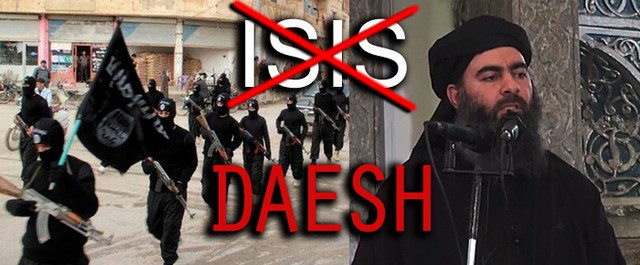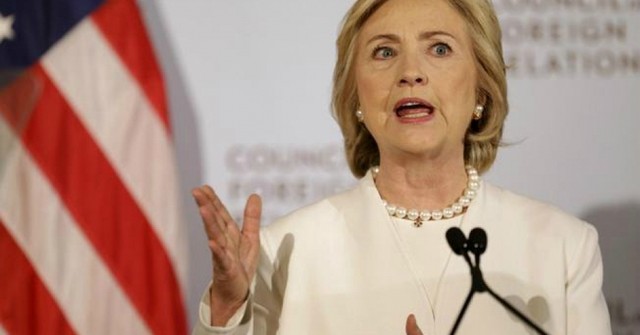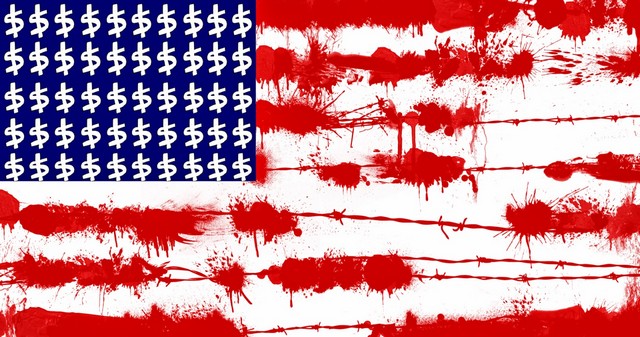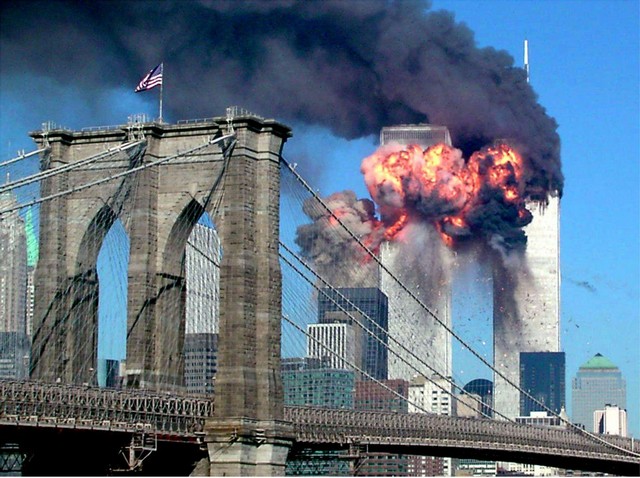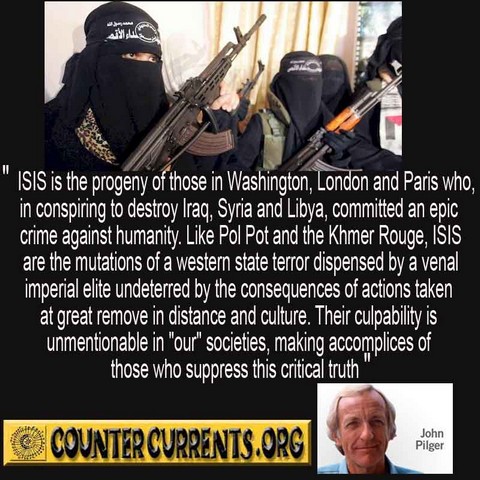By Dr Gideon Polya
The appalling Paris atrocity (130 killed) has led Hollande and Obama to call for the destruction of Islamic State i.e. genocide as defined by the UN Genocide Convention. A major report by 3 physician organizations recently estimated that 2 million Muslims had died in the US War on Terror but UN data show that Muslim avoidable deaths from deprivation in countries subject to Western military intervention in 2001-2015 now total about 27 million, this demanding peace now and ICC prosecutions of those responsible for this Muslim Holocaust and Muslim Genocide.
President Obama (Antalya, Turkey, 16 November 2015) stated: “Tragically, Paris is not alone. We’ve seen outrageous attacks by ISIL in Beirut, last month in Ankara, routinely in Iraq. Here at the G20, our nations have sent an unmistakable message that we are united against this threat. ISIL is the face of evil. Our goal, as I’ve said many times, is to degrade and ultimately destroy this barbaric terrorist organization” [1].
President Francois Hollande (17 November 2015) stated: “France is at war. No barbarians will prevent us from living how we have decided to live. To live fully. Terrorism will never destroy the republic, because the republic will destroy terrorism’… The sponsors of the attack in Paris must know that their crimes further strengthens the determination of France to fight and to destroy them. We must do more. Syria has become the largest factory of terrorists the world has ever known. France is not engaged in a war of civilisations because those assassins don’t represent a civilisation. Our democracy has triumphed before over adversaries that were much more formidable than these cowards” [2].
There has been saturation coverage in the Western media of the appalling Paris tragedy that killed 130 people on 13 November 2015, this coverage dwarfing reportage of the recent Kunduz Hospital atrocity in Afghanistan perpetrated by the US (22 killed, 2 October 2015 ), the most recent Beirut Massacre by jihadi non-state terrorists (43 killed, 12 November 2015) and the Bamako Mali Massacre by jihadi non-state terrorists (27 killed, 20 November 2015) – clear evidence of the entrenched and egregious racism of the anti-Arab anti-Semitic, Islamophobic and Neocon American and Zionist Imperialist (NAZI)-perverted and subverted Western Mainstream media.
The eminent US organization Just Foreign Policy has estimated that there have been 1.5 million “Iraqi deaths due to the US invasion” and I have estimated (based on UN Population Division 2006 Revision data) that to this we should add a further 1.2 million Iraqis killed through war-imposed deprivation [4, 5]. However the ABC News of the taxpayer-funded ABC (Australia’s equivalent of the UK BBC) commenting on the US withdrawal in 2011 stated: “The withdrawal ends a war that left tens of thousands of Iraqis and nearly 4,500 American soldiers dead” [6].
Another ABC News report about Wikileaks document releases states: “The founder of the WikiLeaks website says hundreds of thousands of US military documents leaked by the website show the truth about the Iraq war. The documents suggest senior US commanders turned a blind eye on torture by the Iraqi authorities and show the US has kept records of civilian deaths, despite previously denying it. The documents suggest senior US commanders turned a blind eye on torture by the Iraqi authorities and show the US has kept records of civilian deaths, despite previously denying it. It has put the death toll at 109,000, including more than 66,000 civilians. The US has criticised the release, saying the documents are classified and could lead to military and civilian deaths. But Julian Assange has defended his actions at a press conference just a short while ago, saying the release serves the public interest” [7] .
The “Iraq Body Count” project currently reports “total violent deaths including combatants 224,000”, this highly flawed estimate being unwisely based on the dodgy evidence of media and official reports [8]. The mendacious BBC which, like the endlessly lying, Neocon American and Zionist Imperialist (NAZI)-perverted Australian ABC, has an appalling record of malreportage [9, 10] opines: “Other reports and surveys have resulted in a wide range of estimates of Iraqi deaths. The UN-backed Iraqi Family Health Survey estimated 151,000 violent deaths in the period March 2003 – June 2006. Meanwhile, The Lancet journal in 2006 published an estimate of 654,965 excess Iraqi deaths related to the war of which 601,027 were caused by violence” [11].
Western Mainstream media under-reporting in claiming circa 20,000-200,000 Iraqi deaths due to the US War on Terror – when the true figure from top medical epidemiologists, the UK ORB organization and UN demographers is probably in excess of 2 million Iraqi deaths from violence or imposed deprivation – is genocide-ignoring and holocaust-ignoring on a massive scale. A holocaust involves the death of huge numbers of people whereas genocide is defined more precisely by Article 2 of the UN Genocide Convention which states that “In the present Convention, genocide means any of the following acts committed with intent to destroy, in whole or in part, a national, ethnic, racial or religious group, as such: a) Killing members of the group; b) Causing serious bodily or mental harm to members of the group; c) Deliberately inflicting on the group conditions of life calculated to bring about its physical destruction in whole or in part; d) Imposing measures intended to prevent births within the group; e) Forcibly transferring children of the group to another group.” [4].
Genocide-ignoring and holocaust–ignoring is far, far worse than repugnant genocide-ignoring and holocaust denial because at least the latter permit public discussion of the matter. The endlessly lying, Neocon American and Zionist Imperialist (NAZI)-perverted Western Mainstream media are involved in massive lying by omission, lying by commission, genocide-ignoring, holocaust–ignoring and effective genocide-ignoring and holocaust denial.
Of course this is not new. Thus, for example, generation after generations of lying journalists, politicians, and historians in the English-speaking world have resolutely ignored the “forgotten” WW2 Bengali Holocaust in which the British with Australian complicity deliberately starved 6-7 million Indians to death for strategic reasons (genocidally racist White Australia was complicit by withholding food from starving Indian from its huge wartime grain stores) [12-15]. History is written by the victors and Western Mainstream media presstitutes are resolutely committed to untruth [16, 17].
It gets worse. Iraq has been subject to repeated Western invasion in the century since British invasion in 1914 (racist White Australia is currently involved in its Seventh Iraq War and its Third Syrian War in a century) and Iraqi deaths from violence or war-imposed deprivation since 1914 now total 9 million [4]. Further, Iraq is but one of 20 substantially or significantly Muslim countries variously invaded, occupied, sanctioned and /or bombed by US Alliance forces since the US Government’s 9-11 false flag atrocity on 11 September 2001 in which about 3,000 people were killed [3].
All of this raises the key questions of (1) precisely how many millions of Muslims have died from violence or from imposed deprivation in substantially Muslim countries attacked by the US Alliance since 9-11; and (2) how the civilized world should respond.
Kit O’Connell (a US journalist from Austin, Texas, a Daily Staff Writer for MintPress News, and Associate Editor of Shadowproof) (2015): “It may never be possible to know the true death toll of the modern Western wars on the Middle East, but that figure could be 4 million or higher. Since the vast majority of those killed were of Arab descent, and mostly Muslim, when would it be fair to accuse the United States and its allies of genocide? A March report by Physicians for Social Responsibility calculates the body count of the Iraq War at around 1.3 million, and possibly as many as 2 million. However, the numbers of those killed in Middle Eastern wars could be much higher. In April, investigative journalist Nafeez Ahmed argued that the actual death toll could reach as high as 4 million if one includes not just those killed in the wars in Iraq and Afghanistan, but also the victims of the sanctions against Iraq, which left about 1.7 million more dead, half of them children, according to figures from the United Nations [18].
Dr Nafeez Ahmed ( investigative journalist, international security scholar, author of “Zero Point” and associated with the Institute for Policy Research and Development) has concluded that “In Iraq alone, the US-led war from 1991 to 2003 killed 1.9 million Iraqis; then from 2003 onwards around 1 million: totalling just under 3 million Iraqis dead over two decades… the total Afghan death toll due to the direct and indirect impacts of US-led intervention since the early nineties until now could be as high 3-5 million” [19].
International Physicians for the Prevention of Nuclear War (IPPNW), Physicians for Social Responsibility (PSR) and Physicians for Global Survival (PGS) published a detailed and documented major report in March 2015 on Muslim deaths in Western wars that has been ignored by Mainstream media but concluded (2015): “Executive Summary. This investigation come to the conclusion that the war has, directly or indirectly, killed [in 2011-2013] around 1 million people in Iraq, 220,000 in Afghanistan and 80,000 in Pakistan i.e. a total of 1.3 million. Not included in this figure are further war zones such a Yemen. The figure is approximately 10 times greater than that of which the public, experts and decision –makers are aware of [sic] and propagated by the media and major NGOs. And this is only a conservative estimate. The total number of deaths in the three countries named above could also be in excess of 2 million, whereas a figure below 1 million is extremely unlikely” [20].
“Iraq Body Count” makes the absurd claim of 224,000 total violent Iraqi deaths including combatants since the 2003 invasion [8], this being based on media reports, an approach that has been shown by top medical epidemiologists to be severely flawed [4]. The Physicians’ Report [20] estimates 1 million Iraqi deaths from violence or war-imposed deprivation in the period 2011-2011 whereas the eminent US Just Foreign Policy estimates – based on data from the UK ORB polling organization and from polling by US medical epidemiologists published in The Lancet – that 1.5 million Iraqis have died due to the US invasion and comments: “The number is shocking and sobering. It is at least 10 times greater than most estimates cited in the US media, yet it is based on a scientific study of violent Iraqi deaths caused by the U.S.-led invasion of March 2003” (noting that top US medical epidemiologists in their paper in The Lancet estimated that 90% of the deaths found were violent) [5].
Using data from the UN Population Division 2006 Revision data I have made an upper estimate of 2003-2011 Iraqi avoidable deaths from deprivation totalling 1.2 million, this leading to an estimate of 2.7 million Iraqi deaths from violence (1.5 million) or from war-imposed conditions as determined from differential pre- and post-invasion mortality data (1.2 million) in the period 2003-2011. This approach assumed that these 2 data sets (i.e. “deaths from violence” and “deaths from war-imposed conditions ”) do not overlap if violently killed people do not make it to hospitals etc for “official counting” – indeed the gross, up to 7-fold under-estimate of Iraqi violent deaths by “Iraq Body Count” based on “official counting” validates my approach [4]. A related approach estimates 7.2 million Afghan deaths post-9-11 from violence (1.7 million) or war-imposed deprivation (5.5 million) [21, 22].
Crucially, while the Physicians ‘ Report [20]. estimates “deaths from war-related conditions” as determined from differential immediately pre- and post-invasion mortality data, I assume that the historical pre-invasion trend of massive decreases in mortality in Iraq (and Syria) should have continued and indeed assume that the Iraqi mortality rate post-1990 could and should have attained the base-line rate for high birth-rate impoverished countries of about 4 deaths per 1,000 of population per year and hence given an avoidable death rate of zero (0) but for war-imposed conditions. In other words, the invasion of Iraq not only yielded violent deaths and increased avoidable deaths relative to the pre-invasion year, it also blocked a quite achievable rapid decline to zero avoidable deaths per annum [23].
Avoidable death, avoidable mortality, excess death, excess mortality, premature death, untimely death, death that should not have happened) is the difference between the observed deaths in a country and the deaths expected for a peaceful, decently governed country with the same demographics (i.e. the same birth rate and age distribution) [23]. Thus, for example, in 2015 GDP per capita is abut $6,000 for both Cuba and China and about $15,000 for both Iraq and Libya [24], but while there are zero (0) annual avoidable deaths in Cuba and China, as catalogued below annual avoidable deaths in war-devastated Iraq (population 36.4 million) and Syria (population 6.3 million) currently total 47,000 and 14,000, respectively [23].
Finally, the Physicians’ Report estimate of 80,000 Pakistani war-related deaths in 2001-2011 is about 100 times lower than the 9.1 million Pakistani avoidable deaths from deprivation in the period October 2001- October 2015 as estimated (see below) using UN Population 2015 Revision data [24] and assuming a base-line mortality rate for this high birth rate, impoverished country of 4 deaths per 1,000 births per year for zero avoidable mortality that could and should have been attained in Pakistan but for US-driven militarism, dictatorship, terrorism, corruption and war.
Soap, insecticide-impregnated mosquito netting, antibiotics, immunization, basic preventative medicine, maternal education. maternal literacy, and good primary health care are vastly cheaper than drones, bombs, militarization, war and nuclear weapons, as well illustrated by the marvellous example of the terrific health outcomes in US sanctions-impoverished but well-governed Cuba which has an infant mortality rate about the same as for the US that has a 9-fold greater per capita GDP [23, 24].
T o avoid the controversy about how many Muslims have actually been violently killed, one can simply consider how many Muslims have died avoidably from Western war- or Western hegemony- imposed deprivation in the 14 year period from October 2001- October 2015 in substantially or significantly Muslim countries subject to Western sanctions, attack or occupation in that period. This approach has the benefit of being uncontroversial and conservative e.g. it ignores violent deaths in which Muslim bodies or body parts went into mass graves or otherwise did not make it to hospitals or morgues for “official counting”. Of course, whether a child is slowly and painfully killed by economically- and/or militarily-imposed deprivation or is killed quickly by bombs or bullets, the death is just as final and just as irreversible [23].
Below is an alphabetical list of 20 substantially or significantly Muslim countries variously attacked, invaded, occupied or sanctioned by the US Alliance in the Neocon American and Zionist Imperialist (NAZI)-promoted US War on Terror since the 9-11 atrocity that numerous science, architecture, engineering , aviation, military and intelligence experts believe was a US Government 9-11 false flag operation (with some suggesting Israeli involvement) [3].
Listed below for these 20 US Alliance-violated, substantially or significantly Muslim countries are (a) 2015 population [25]; (b) 1950-2005 avoidable deaths [24], (c) annual avoidable deaths (2015) from the latest UN 2015 Revision data [25], assuming a baseline mortality for high birth rate, impoverished but otherwise peaceful and well-governed countries of about 4 deaths per 1,000 of population per year (for Lebanon, Libya, Syria and Palestine with death rates close to this baseline, avoidable mortality was estimated as 1.4 times the under-5 infant deaths) [24]; (d) average-based 14 year avoidable deaths for the post-9-11 period of 2001-2015, (e) present annual per capita GDP [24], (f) % Muslim (upper estimates), (g) post-9-11 Muslim avoidable deaths based on Muslim percentage in each country, and (h) Western invasion dates and details.
Post-9-11 avoidable deaths in 18 countries with substantial or significant Muslim populations and variously subject to Western military operations in the post-9-11 US War on Terror:
1. Afghanistan: (a) 32.5 million, (b) 16.6 million. (c) 149,000, (d) 2.2 million, (e) $1,900, (f) 99.8% Muslim, (g) 2.2 million post-9-11 Muslim avoidable deaths, and (h) Afghanistan was subject to repeated UK invasions in the 19th century but finally recovered independence in 1919; after the US-backed removal of a socialist government in 1978, the Russians invaded and Afghanistan endured decades of war against the Russians (1979-1989) and thence civil war (1989-1996); in 2001 Afghanistan was invaded by the US Alliance (notably the US, UK, France, Germany, Netherlands, Australia, Canada, New Zealand) on the false basis of Osama bin Laden and Al Qaeda being responsible for 9-11.
2. Burkina Faso: (a) 18.1 million, (b) 6.8 million, (c) 109,000, (d) 1.5 million, (e) $1,700, (f) 60.5% Muslim, (g) 0.9 million post-9-11 Muslim avoidable deaths, and (h) Burkino Faso was a French colony until 1960, post-independence French military presence and French forces boosted in 2013 as part of Operation Barkhane directed against Muslim rebels in the Sahel.
3. Central African Republic: (a) 4.9 million, (b) 2.3 million, (c) 55,000, (d) 0.8 million, (e) $600, (f) 15.0% Muslim, (g) 0.1 million post-9-11 Muslim avoidable deaths, and (h) the Central African Republic was a French colony until 1960, post-independence French military presence and France further boosted forces in 2013 as Muslim Genocide expanded (almost all Muslims have been expelled from the capital).
4. Chad: (a) 14.0 million, (b) 5.1 million, (c) 147,000, (d) 1.9 million, (e) $2,600, (f) 53.1% Muslim, (g) 1.0 million post-9-11 Muslim avoidable deaths, and (h) Chad became ostensibly independent in 1960 but there were major post-independence French military involvements in Northern Chad and France further boosted forces in 2013 as part of Operation Barkhane directed against Muslim rebels in the Sahel.
5. Côte D’Ivoire: (a) 20.1 million, (b) 7.0 million. (c) 199,000, (d) 3.0 million, (e) $3,100, (f) 38.6% Muslim, (g) 1.2 million post-9-11 Muslim avoidable deaths, and (h) Cote D’Ivoire suffered major French military involvements in suppressing socialists before and after independence in 1960 and a major French re-invasion in 2002.
6. Djibouti: (a) 0.9 million, (b) 141,000, (c) 8,000, (d) 0.1 million, (e) $3,100, (f) 94.0% Muslim, (g) 0.1 million post-9-11 Muslim avoidable deaths, and (h) Djibouti suffered a major, continuing French, US and British presence after independence in 1977; it was a base for French participation in the 1990-1991 Gulf War; French suppressed Affar rebellion in 1977-2002; France gave the former French Foreign Legion’s Camp Lemonnier to the government of Djibouti, which then leased it to the US in 2001; France maintains over 1,500 troops in Djibouti and French forces in Djibouti have taken part in operations in Somalia, the Democratic Republic of Congo, and the Côte D’Ivoire.
7. Iraq: (a) 36.4 million, (b) 5.3 million, (c) 47,000. (d) 0.7 million, (e) $15,300, (f) 97.0% Muslim, (g) 0.7 million post-9-11 Muslim avoidable deaths, and (h) Iraq suffered invasion by the UK in 1914 with the UK continuing to repress Iraqi rebellion in Iraq up to and including WW2, notwithstanding ostensible Iraqi independence in 1932; Gulf War (1990-1991) in which 0.2 million Iraqis were killed; 1990-2003 Sanctions; 2003-2011 US Alliance Iraq War; renewed US and Australian military advisers and renewed bombing of Iraq in 2014 by US Alliance (US, UK, Australia, France).
8. Iran: (a) 79.1 million, (b) 14.3 million, (c) 55,000 (d) 1.0 million, (e) $17,400, (f) 99.4% Muslim, (g) 1.0 million post-9-11 Muslim avoidable deaths, and (h) Iran is one of the world’s oldest nations and has not invaded another country for several hundred years; the US engineered a coup against the secular and democratic Mossadegh government in 1953 with the installation of dictatorship under the Shah; the US imposed sanctions on Iran after the revolution that removed the Shah in 1979; the US backed Iraq in the Iraq-Iran War in which 1.5 million Iranians were killed (Iranian 1980-1988 avoidable deaths 2.1 million); under urging from the Zionist-perverted US the UN imposed sanctions on Iran over its nuclear energy program that Iran declared to be for peaceful purposes only; the last major direct violent US action against Iran was the shooting down of Iran Air Flight 655 by a US guided missile cruiser killing all 290 on board; US ally Apartheid Israel bombed an Iranian ship in Sudan in 2009; an estimated 68,000 Iranians have died since 9-11 from opiate drug-related causes due to the US restoration of the Taliban-destroyed Afghan opium industry from 6% of world share in 2001 to 93% by 2007 (1.2 million people have died world-wide since 9-11 due to US Alliance restoration of the Taliban-destroyed Afghan opium industry, the breakdown as of 2015 including 280,000 Americans, 256,000 Indonesians, 68,000 Iranians, 25,000 British, 14,000 Canadians, 10,000 Germans, 5,000 Australians and 500 French; about 4,000 Iranian border guards have died trying to block opiate smuggling from US-occupied Afghanistan; under urging from the Zionist -perverted US the UN imposed deadly sanctions on Iran in 2006 over its nuclear energy program that Iran declared to be for peaceful purposes only (no sanctions were applied to the nations including Apartheid Israel that actually have nuclear weapons) – these opiate-related deaths and deaths from sanctions are reflected in huge post-9-11 avoidable mortality in Iran.
9. Lebanon: (a) 5.9 million, (b) 0.5 million, (c) 1,000, (d) 16,000, (e) $18,000, (f) 59.5% Muslim, (g) 10,000 post-9-11 Muslim avoidable deaths, and (h) Lebanon suffered French occupation after WW1 and gained independence in 1944; substantially occupied by Apartheid Israel in 1982 (3,000 Palestinians killed in the Sabra and Shatila Massacre); Israel withdrawal in 2000; in 2006 Apartheid Israel attacked again killing over 1,000, making 1 million homeless and destroying infrastructure on a huge scale.
10. Libya: (a) 6.3 million, (b) 0.8 million, (c) 6,000, (d) 78,000 (27,000 in 2011-2015), (e) $15,900, (f) 94.0% Muslim, (g) 73,000 post-9-11 Muslim avoidable deaths, and (h) Libya gained independence in 1950 and under rule by Muammar Gaddafi in 1969-2011 became the most prosperous country in all of Africa, but the 2011 France-UK-US (FUKUS) Alliance bombing campaign removed Gaddafi, splintered and devastated the country, killed 100,000 people and generated 1 million refugees with annual avoidable deaths increasing 3-fold after Western intervention.
11. Mali: (a) 20.1 million, (b) 7.0 million, (c) 199,000, (d) 1.8 million, (e) $1,700, (f) 90.0% Muslim, (g) 1.6 million post-9-11 Muslim avoidable deaths, and (h) Mali was brutally subdued by the French in the 19th century but secured independence in 1960 but with French hegemony; in 2013, France launched airstrikes against Tuareg rebels who had conquered the northern half of the country and finally defeated them in a so-called Operation Serval. France followed up Operation Serval with Operation Barkhane dedicated to killing Muslim rebels in the Sahel countries of Mali, Mauritania, Burkina Faso, Niger and Chad.
12. Mauritania: (a) 17.6 million, (b) 1.3 million, (c) 123,000, (d) 2.3 million, (e) $4,300. (f) 100.0% Muslim, (g) 2.3 million post-9-11 Muslim avoidable deaths, and (h) Mauritania was invaded by the French in the 19th century so as to consolidate French territory from Senegal to the Sudan, and Mauritanian resistance was only finally overcome in the 1930s; Mauritania became formally independent in 1960 but was subject to French hegemony and interference. France’s Operation Barkhane involves thousands of air-supported French troops dedicated to killing Muslim rebels in the Sahel countries of Mali, Mauritania, Burkina Faso, Niger and Chad.
13. Niger: (a) 19.9 million, (b) 6.6 million, (c) 111,000, (d) 1.8 million, (e) $1,100, (f) 94.0% Muslim, (g) 1.7 million post-9-11 Muslim avoidable deaths, and (h) Niger was conquered by France in the late 19th century but became ostensibly independent in 1960 but under French hegemony; the French Operation Barkhane involves thousands of air-supported French troops dedicated to killing Muslim rebels in the Sahel countries of Mali, Mauritania, Burkina Faso, Niger and Chad.
14. Pakistan: (a) 188.9 million, (b) 49.7 million, (c) 660,000, (d) 9.1 million, (e) $4,700, (f) 96.0% Muslim, (g) 8.7 million post-9-11 Muslim avoidable deaths, and (h) Pakistan gained independence from the UK in 1947 after 2 centuries of British rule in which 1.8 billion Indians died avoidably from deprivation in the British Raj; independence in 1947 was marked by generation of 18 million refugees between India and Pakistan (half Muslim, half Hindu) and up to 1 million people were killed; in 1971 US-backed Pakistani forces killed 3 million mostly male Bengalis and raped 300,000 Bengali women in a Bengali Holocaust that marked the creation of Bangladesh; Australian-targeted US drone attacks commenced in 2004.
15. Palestine: (a) 4.7 million, (b) 0.7 million, (c), 5,000, (d) 70,000, (e) $4,900 (cf its Occupier Apartheid Israel’s $33,000) , (f) 85.0% Muslim, (g) 60,000 post-9-11 Muslim avoidable deaths, and (h) Palestine has an ancient history dating back to the very start of agrarian civilization; British forces invaded in 1914 and together with Australian and New Zealand Army Corps (ANZAC) forces conquered Palestine; the 1917 Balfour Declaration promised Palestine to the genocidal Zionists as a Jewish Homeland; Surafend Massacre of Palestinians by Australian and New Zealand ANZAC troops in 1918; 1948 creation of the State of Israel with massive forcible expulsion of 800,000 Palestinians and Zionist seizure of about 80% of Palestine; in 1967 Israel seized all of Palestine plus part of Syria; 90% of the land of Palestine has now been ethnically cleansed and Israeli Apartheid means that of 12 million Palestinian, 6 million are forbidden to step foot in Palestine and of 6 million Palestinians living under Israeli rule only 28% ( 1.7 million Palestinian Israelis) can vote for the government ruling them – the rest have essentially zero human rights; 2 million Palestinians have died since 1936 from Zionist violence (0.1 million) or Zionist -imposed deprivation (1.9 million).
16. Philippines: (a) 100.7 million, (b) 9.1 million, (c) 270,000, (d) 2.7 million, (e) $7,000, (f) 11.0% Muslim, (g) 0.3 million post-9-11 Muslim avoidable deaths, and (h) the Philippines was acquired by the US from Spain at the conclusion of the Spanish-American War (1898) but in the subsequent 1899-1913 Philippines-US War about 1 million Filipinos died; the Philippines became independent in 1946 but with retention of US bases; in the 21st century US forces returned to combat communist rebels and thence Muslim rebels in the south in Operation Enduring Freedom – Philippines (OEF-P) (many Filipinos object to this military action by the US in their country).
17. Somalia: (a) 10.8 million, (b) 5.6 million, (c) 91,000, (d) 1.2 million, (e) $600, (f) 96.0% Muslim, (g) 1.2 million post-9-11 Muslim avoidable deaths, and (h) Somalia was repeatedly invaded by Italy in the 19th and 20th centuries. The British took over Somalia in WW2. Independence in 1960 was followed by war against Ethiopia and civil war, the effects of which were exacerbated by drought and famine. The US invaded in 1992 and after extensive civil war an Islamic administration assumed power in 2005. However the US backed an Ethiopian invasion in 2007 and thence a Kenyan invasion. In 2009 France and Germany invaded Somali waters to retake a captured French yacht and in 2013 French special forces from Djibouti failed in an operation to rescue a captured French intelligence agent.
18. Sudan: (a) 40.2 million, (b) 13.5 million, (c) 157,000, (d) 2.3 million, (e) $4,300, (f) 97.0% Muslim, (g) 2.3 million post-9-11 Muslim avoidable deaths, and (h) Sudan was conquered by the UK in 1898 but eventually became independent in 1958; the US under Clinton notoriously bombed a Sudan pharmaceutical factory in 1998 (Professor Noam Chomsky estimated that 10,000 Sudanese would have died from disease as a result); US ally Apartheid Israel bombed Sudan in 2009 and such Israeli bombing attacks on Sudan are presently continuing. Apartheid Israeli arms are heavily involved in the US-backed civil war in the newly independent South Sudan.
19. Syria: (a) 18.5 million, (b) 2.2 million, (c) 14,000, (d) 190,000 (68,000 in 2011-2015), (e) $5,100, (f) 96.0% Muslim, (g) 171,000 post-9-11 Muslim avoidable deaths, and (h) Syria, one of the oldest nations in the world, was allocated to France by the 1916 Anglo-French Sykes-Picot Agreement that divided the Middle East between Britain and France; Syria was put under a League of Nations mandate to France in 1920; in 1944 Syria became independent and in 1945 Syria became a founding member of the UN with the last French forces leaving Syria in 1946; in 1967 the Syrian Golan Heights region was captured and largely ethnically cleansed by Apartheid Israel which continues to periodically bomb Syria; commencement of Sunni rebellion in 2011 backed diplomatically and materially by Turkey, the US, UK, France, Qatar, Jordan, Saudi Arabia, and Apartheid Israel. The Syrian Civil War has so far killed about 0.3 million people violently, killed a similar number of people through war-imposed deprivation, and generated about 12 million refugees. Syria was once a haven of religious toleration and a world leader per capita in providing haven for refugees, but over half of its population are now refugees themselves and Syria has now been devastated in a sectarian civil war involving the Assad Government versus anti-Assad Sunni rebels (of which ISIS is the most powerful) that are variously backed by the UK, US , France, Turkey, Qatar, Saudi Arabia, Jordan, Australia and Apartheid Israel.
20. Yemen: (a) 19.9 million, (b) 6.6 million, (c) 111,000, (d) 1.2 million, (e) $1,100, (f) 100.0% Muslim, (g) 1.2 million post-9-11 Muslim avoidable deaths, and (h) South Yemen gained independence from the UK in 1967 and North and South Yemen unified in 1989; continuing armed conflict with Australian-targeted US drone attacks in the 21st century that are continuing. Currently Yemen is being war criminally invaded by an anti-Houthi Saudi-led Coalition including Saudi Arabia, United Arab Emirates, Bahrain, Qatar, Kuwait, Egypt, Jordan, Morocco, Senegal, and Sudan.
Summary and conclusions.
The post-9-11 avoidable deaths in the 20 countries violated by the West in the post-9-11 War on Terror total 34.0 million. However we can re-assess this data by considering the Muslim percentage of the population in these 20 countries and can estimate that post-9-11 Muslim avoidable deaths in these 20 US Alliance-violated countries total 26.8 million, noting that, as discussed above, it is likely that most of the violent Muslim deaths in the Zionist-promoted US War on Terror are not included in this estimate. About half the victims of this Neocon American and Zionist Imperialist (NAZI)-prosecuted Muslim Holocaust and Muslim Genocide are children.
This carnage of 26.8 million post-9-11 Muslim avoidable deaths is 26,800,000/130 = 206,154 or about 200,000 times greater than the 130 murdered in the recent appalling Paris massacre – however, in contrast to the saturation coverage of the appalling Paris atrocity, this Muslim Holocaust and Muslim Genocide is resolutely ignored by genocidally racist, anti-Arab anti-Semitic, Islamophobic, and Neocon American and Zionist Imperialist (NAZI)-subverted Western Mainstream media.
Using data from the UN Population Division 2006 Revision of World Population Prospects it was previously determined that Iraqi avoidable deaths in 1990-2003 and 2003-2011 totalled 1.7 million and 1.2 million, respectively, and combining this data with Gulf War violent deaths of 0.2 million and Iraq War violent deaths of 1.5 million, yielded estimates of Iraqi deaths from violence or violently-imposed deprivation totalling 1.9 million (1990-2003), 2.7 million (2003-2011) and 4.6 million (1990-2011) [4, 22, 23]. However using the present UN 2015 Revision data [25] one estimates Iraqi avoidable deaths in 1990-2003 and 2003-2011 totalling 0.5 million and 0.4 million, respectively, this yielding estimates of Iraqi deaths from violence or violently-imposed deprivation totalling 0.7 million (1990-2003), 1.9 million (2003-2011) and 2.6 million (1990-2011). The UN 2015 Revision data on Iraq may underestimate avoidable deaths because they are based on data provided by the US-installed regime which, for example, implausibly claims that Iraq under-5 infant mortality declined after imposition of Sanctions in 1990 and declined further after the US invasion in 2003 [25].
Similarly, using 2006 Revision data it was determined that Afghan avoidable deaths and violent deaths in 2001-2014 totalled 5.5 million and 1.7 million, respectively for a total of 7.2 million post-invasion deaths from violence or from deprivation. However using the present UN 2015 Revision data [25] based on data from the government of US occupied Afghanistan one estimates that Afghan avoidable deaths and violent deaths in 2001-2015 have totalled 2.3 million and 0.7 million, respectively, for a total of 3.0 million post-invasion deaths from violence or from deprivation.
The 2015 Paris Massacre in which 130 innocent civilians were murdered by jihadis is a shocking crime that must be unequivocally condemned but is already being exploited (a) by the jihadi non-state terrorist perpetrators as a victory and evidence for more atrocities to come, and (b) by the US state terrorists, French state terrorists and US Alliance state terrorists as a “French 9-11” with calls from Obama and Holland to genocidally destroy jihadi rebels in Syria and Iraq [1, 2].
Completely missing from the continuing hysterical response to the Paris atrocity from US lackey Western Mainstream journalists, politicians and academics is any public airing of the horrendous reality of 27 million Muslims dying avoidably since 9-11 in 20 substantially or significantly Muslim countries that have been attacked by US Alliance state terrorists. Jihadi non-state terrorists must be condemned (a) for the violent crimes they personally commit against innocent people and (b) for the vastly greater crimes committed by the US Alliance against Muslims in response to jihadi outrages. Indeed jihadi non-state terrorists are among the greatest assets of US imperialism – every jihadi atrocity is another excuse trumpeted by Mainstream media for more atrocities against the Muslim world by US state terrorists and US Alliance state terrorists.
The Paris atrocity can be seen as “blowback” for horrendous crimes committed by the US Alliance against the Muslim world from West Africa to South East Asia [26, 27]. The horrible reality is that the US has a long history of false-flag operations(with 9-11 being the most immediately and subsequently deadly) [3] , supporting terrorism and exploiting terrorist acts by Indigenous insurgents lacking military industries, navies, airforces and tanks, and essentially only armed with light arms and explosives for bombs.
Indeed the US has along history of supporting terrorists (e.g. US-backed terrorists in Ecuador who would bomb Catholic churches knowing that the socialists would be blamed; the US-backed Gladio organization that committed atrocities in post-war Europe that would be blamed on communists; and backing jihadi fighters in Afghanistan in the 1980s and in the Balkans in the 1990s) [28]. Indeed the US has an appalling record of replacing secular governments in the Muslim world with sectarian regimes (e.g. Afghanistan, 1978; Iraq, 2003; Libya, 2011; and now in Syria today but for Russian support for the Assad Government ) [29].
Even the appalling Western Mainstream media can no longer ignore the Elephant in the Room realities that (a) the illegal US Alliance invasion of Iraq generated sectarian warfare and the Sunni rebellion that transmuted into ISIS, and (b) support for anti-Assad rebels by the US Alliance state terrorism – US state terrorism, UK state terrorism, French state terrorism, Australian state terrorism, Apartheid Israeli state terrorism, Turkish state terrorism, Jordanian state terrorism, Qatari state terrorism and Saudi Arabian state terrorism – has led to ISIS (Islamic State, IS, ISIL, Daesh) dominating rebel-held Syria.
Peace is the only way but silence kills and silence is complicity. Decent, pro-peace people must wonder what they can do in the face of appalling non-state terrorism (e.g. as exhibited by ISIS in killing 130 innocent people in this latest Paris atrocity) and the vastly worse carnage wrought by US state terrorism, UK state terrorism, French state terrorism, and Apartheid Israeli state terrorism in the Muslim world involving post-9-11 Muslim avoidable deaths in 20 US Alliance-violated countries now totalling 26.8 million. Decent people who are utterly opposed to both non-state terrorism and state terrorism must (a) inform everyone they can, (b) urge and support urgent cease-fire, dialogue and compromise between all parties to prevent a worsening catastrophe in both Iraq and Syria, and (c) urge and apply Boycotts, Divestment and Sanctions (BDS) against all people, parties, politicians, companies, corporations and countries disproportionately involved in militarism, violence, war, genocide, non-state terrorism and state terrorism.
References.
[1]. Barack Obama, “Press conference by President Obama – Antalya, Turkey”, White House, 16 November 2015: https://www.whitehouse.gov/the-press-office/2015/11/16/press-conference-president-obama-antalya-turkey .
[2]. Martin Robinson, “France will be in a state of emergency for THREE MONTHS: Holland vows to “destroy” ISIS and pledges “no barbarians will prevent us from living how we have decided to live:”, Daily Mail, 17 November 2015: http://www.dailymail.co.uk/news/article-3320731/France-state-emergency-THREE-MONTHS-Hollande-vows-boost-spending-security-pledges-no-barbarians-prevent-living-decided-live.html ).
[3]. “Experts: US did 9-11”: https://sites.google.com/site/expertsusdid911/ .
[4]. “Iraqi Holocaust Iraqi Genocide”: https://sites.google.com/site/iraqiholocaustiraqigenocide/ .
[5]. Just Foreign Policy, “Iraq Deaths”: http://www.justforeignpolicy.org/iraq .
[6]. “US military marks end of its Iraq war”, ABC News, 16 December 2011: http://www.abc.net.au/news/2011-12-15/us-military-marks-end-of-its-war-in-iraq/3733982 .
[7]. ABC News, “Iraki leaks show scale of civilian casualties” , 24 October 2010: http://www.abc.net.au/news/2010-10-23/iraqi-leaks-show-scale-of-civilian-casualties/2308808 .
[8]. “Iraq Body Count”: https://www.iraqbodycount.org/ .
[9], “Censorship by the BBC”: https://sites.google.com/site/censorshipbythebbc/ .
[10]. “ABC fact-checking unit & incorrect reportage by the ABC (Australia’s BBC)”: https://sites.google.com/site/mainstreammediacensorship/abc-fact-checking-unit ,
[11]. BBC, “Iraq War in figures”, 14 December 2011: http://www.bbc.com/news/world-middle-east-11107739 .
[12]. “Bengali Holocaust (WW2 Bengal Famine) writings of Gideon Polya”, Gideon Polya Writing: https://sites.google.com/site/drgideonpolya/bengali-holocaust .
[13]. Gideon Polya (1998), “Jane Austen and the Black Hole of British History. Colonial rapacity, holocaust denial and the crisis in biological sustainability”, 2008 edition that is now available for free perusal on the web: http://janeaustenand.blogspot.com/ .
[14]. Gideon Polya (1995) ” The Forgotten Holocaust – The 1943/44 Bengal Famine”: http://globalavoidablemortality.blogspot.com.au/2005/07/forgotten-holocaust-194344-bengal.html .
[15]. Gideon Polya (2011), “Australia And Britain Killed 6-7 Million Indians In WW2 Bengal Famine”, Countercurrents, 29 September, 2011: http://www.countercurrents.org/polya290911.htm .
[16]. “Mainstream media censorship”: https://sites.google.com/site/mainstreammediacensorship/home .
[17]. “Mainstream media lying”: https://sites.google.com/site/mainstreammedialying/ .
[18]. Kit O’Connell, “4 million Muslims killed in Western wars: should we call it genocide?”, MintPress News, 18 August 2015: http://www.mintpressnews.com/4-million-muslims-killed-in-western-wars-should-we-call-it-genocide/208711/ .
[19]. Nafeez Ahmed, “Unworthy victims: Western wars have killed 4 million Muslim since 1990”, MintPtress News, 9 April 2015: http://www.mintpressnews.com/unworthy-victims-western-wars-have-killed-four-million-muslims-since-1990/204182/.
[20]. International Physicians for the Prevention of Nuclear War (IPPNW), Physicians for Social Responsibility (PSR) and Physicians for Global Survival (PGS), “Body Count. Casualty figures after 10 years of the “War on Terror” Iraq, Afghanistan, Pakistan”, March 2015: http://www.psr.org/assets/pdfs/body-count.pdf .
[21]. “Afghan Holocaust Afghan Genocide”: https://sites.google.com/site/afghanholocaustafghangenocide/
[22]. “Muslim Holocaust Muslim Genocide”: https://sites.google.com/site/muslimholocaustmuslimgenocide/ ).
[23]. Gideon Polya, “Body Count. Global avoidable mortality since 1950”, that includes an avoidable mortality-related history of every country since Neolithic times and is now available for free perusal on he web: http://globalbodycount.blogspot.com.au/2012/01/body-count-global-avoidable-mortality_05.html .
[24]. “List of countries by GDP (PPP) per capita”, Wikipedia: https://en.wikipedia.org/wiki/List_of_countries_by_GDP_%28PPP%29_per_capita .
[25]. UN Population Division 2015 Revision of World Population Prospects: http://esa.un.org/unpd/wpp/ .
[26]. Gideon Polya,”Appalling Paris Atrocity – Non-State Terrorist Blowback For US Alliance And French State Terrorism Atrocities”, Countercurrents, 16 November, 2015: http://www.countercurrents.org/polya161115.htm .
[27]. Gideon Polya, “Horrendous US state terrorism and French state terrorism led to the appalling non-state terrorist Paris atrocity”, Gideon Polya Writing, 2015-11-18 : https://sites.google.com/site/gideonpolyawriting/2015-11-18 .
[28]. Gideon Polya, “US Profits From Jihadist Terrorism”, Countercurrents, 19 November, 2004: http://www.countercurrents.org/us-polya191104.htm .
[29]. Gideon Polya, “Fundamentalist America Has Trashed Secular Governance, Modernity, Democracy, Women’s Rights And Children’s Rights In The Muslim World”, Countercurrents, 21 May, 2015: http://www.countercurrents.org/polya210515.htm .
Dr Gideon Polya has been teaching science students at a major Australian university for 4 decades. He published some 130 works in a 5 decade scientific career, most recently a huge pharmacological reference text “Biochemical Targets of Plant Bioactive Compounds” (CRC Press/Taylor & Francis, New York & London , 2003). He has published “Body Count. Global avoidable mortality since 1950” (G.M. Polya, Melbourne, 2007: http://globalbodycount.blogspot.com/ ); see also his contributions “Australian complicity in Iraq mass mortality” in “Lies, Deep Fries & Statistics” (edited by Robyn Williams, ABC Books, Sydney, 2007: http://www.abc.net.au/radionational/programs/ockhamsrazor/australian-complicity-in-iraq-mass-mortality/3369002#transcript
) and “Ongoing Palestinian Genocide” in “The Plight of the Palestinians (edited by William Cook, Palgrave Macmillan, London, 2010: http://mwcnews.net/focus/analysis/4047-the-plight-of-the-palestinians.html ). He has published a revised and updated 2008 version of his 1998 book “Jane Austen and the Black Hole of British History” (see: http://janeaustenand.blogspot.com/ ) as biofuel-, globalization- and climate-driven global food price increases threaten a greater famine catastrophe than the man-made famine in British-ruled India that killed 6-7 million Indians in the “forgotten” World War 2 Bengal Famine (see recent BBC broadcast involving Dr Polya, Economics Nobel Laureate Professor Amartya Sen and others: http://www.open.edu/openlearn/history-the-arts/history/social-economic-history/listen-the-bengal-famine ). When words fail one can say it in pictures – for images of Gideon Polya’s huge paintings for the Planet, Peace, Mother and Child see: http://sites.google.com/site/artforpeaceplanetmotherchild/ and http://www.flickr.com/photos/gideonpolya/ .
22 November, 2015
Countercurrents.org

